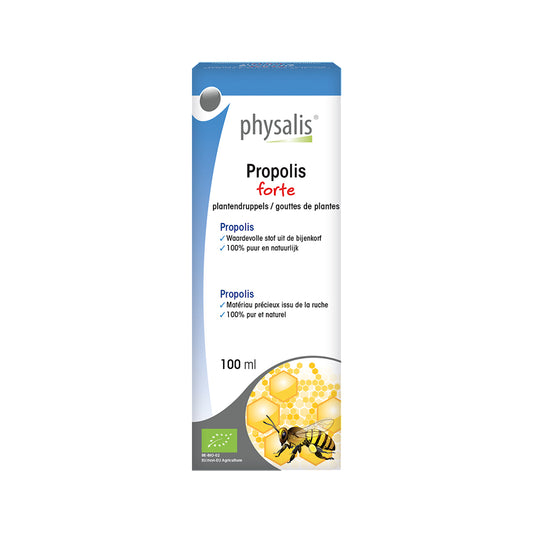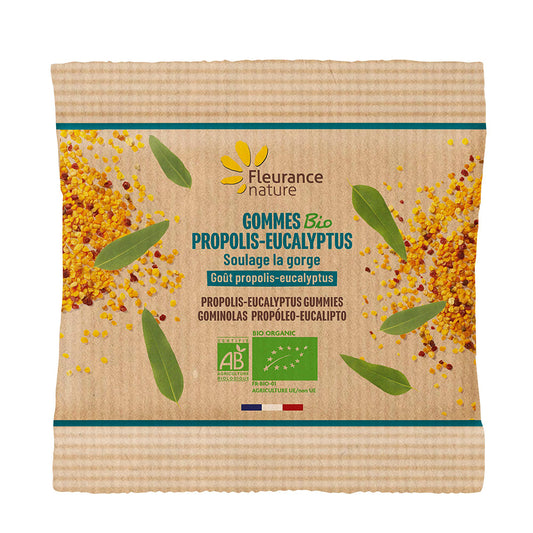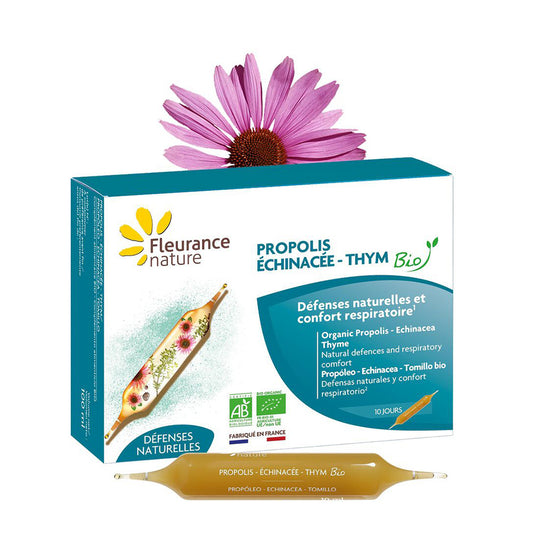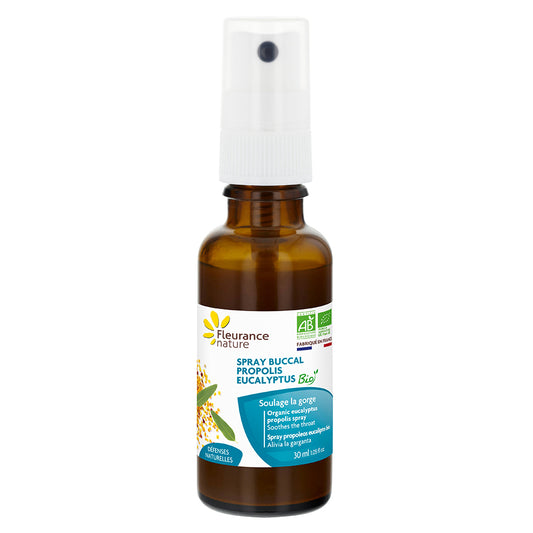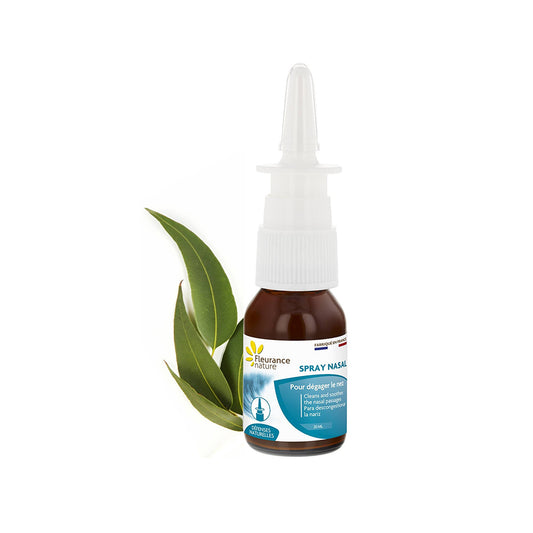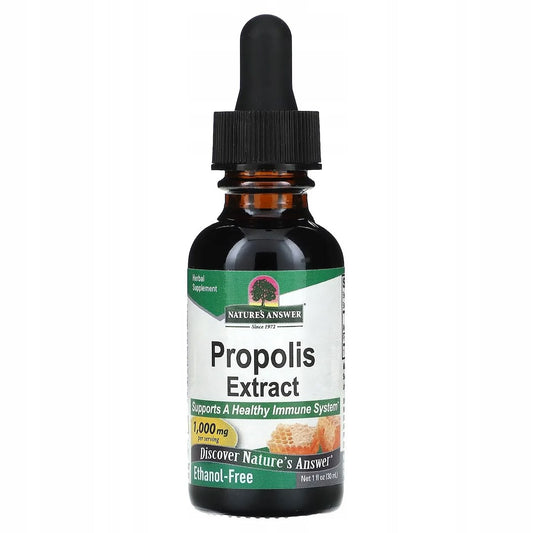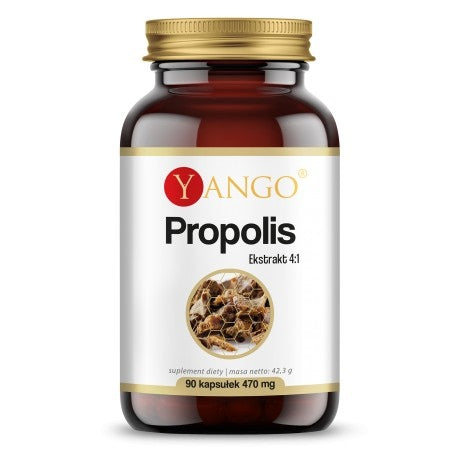
Propolis - Natural antibiotic
Share
Bees are vital to the natural ecosystem and biodiversity, on which we all depend for our survival. They pollinate wild trees and flowers, which then support other insects, birds, bats, mammals, and all food and shelter above the food chain. Additionally, they produce honey and other medicines and health-enhancing compounds beneficial to humans, such as beeswax, bee pollen, and royal jelly. In this article, we explore the world of propolis, examining its origin, composition, and the various ways it promotes human well-being.
Healing properties of propolis
Propolis is often praised as the "natural antibiotic." This resinous substance - derived from these amazing insects, the bees - plays a crucial role in building and protecting the hive. Its benefits extend far beyond the bee colony and also offer us various health advantages.
Propolis, also known as bee glue, is a waxy substance that bees collect and gather from the buds and sap of certain trees and plants, such as birch, poplar, and alder. The word propolis is derived from the Greek words "pro" and "polis," meaning "defense of the city." Bees use propolis to seal and protect the hive, which strengthens structural integrity and forms a barrier against external threats and pathogens such as bacteria, viruses, and fungi. This natural defense not only protects the hive but also contains a treasure trove of bioactive compounds with potentially powerful health benefits. Propolis primarily consists of flavonoids, including chrysin, quercetin, galangin, and pinocembrin, known for their antioxidant and antibacterial properties.
The connection of propolis to supporting the immune system and increasing resistance
Propolis is a versatile miracle that nature has gifted us. Propolis and its extracts have numerous uses in treating various ailments due to their antiseptic, anti-inflammatory, antioxidant, antibacterial, antifungal, and immunomodulatory properties, the latter being one of the most significant features of propolis. The polyphenols and flavonoids in propolis act as immunomodulators, strengthening the body's defense mechanisms and enhancing its ability to resist infections and diseases. The immune system is stimulated by activating macrophages and increasing antibody production. One of the advantages of propolis is that pathogens do not develop resistance to it, making it an ideal supplement during the winter months to support the immune system and increase overall resistance.
Here are some health benefits that propolis may have:
Immune system support
Propolis is known for its immune system strengthening properties. The combination of polyphenols and flavonoids helps modulate the immune response, promoting the body's ability to fight infections and diseases, making it a great natural remedy to support the treatment of colds and respiratory illnesses.
Antimicrobial activity
The antimicrobial properties of propolis are due to its high concentration of bioactive compounds. It has shown effectiveness against various bacteria, viruses, and fungi, making it a natural alternative to traditional antibiotics.
Anti-inflammatory Effect
Inflammation is a common factor in many chronic diseases. The anti-inflammatory properties of propolis help alleviate inflammation and can thus ease conditions such as arthritis and inflammatory skin diseases.
Allergy Modulating
Studies have shown that propolis can inhibit the release of histamine from mast cells, modulating allergies and related symptoms.
Skin Health
Propolis has a skin-protective and soothing effect. It can help treat acne and hyperpigmentation as well as reduce redness and wrinkles.
Blood Pressure Management
Propolis helps ensure that we have adequate nitric oxide levels. Nitric oxide dilates blood vessels, increases blood circulation, and reduces plaque growth and blood clotting.
Wound Healing
Propolis has been used for centuries to promote wound healing. Its antimicrobial and tissue-regenerating properties make it a valuable natural remedy for wounds, burns, and skin infections.
Oral Health
With antimicrobial and anti-inflammatory effects, propolis promotes oral health. It has been included in several oral care products and is recognized for its ability to combat bacteria related to cavities and gum diseases. We often forget that oral health is closely linked to our overall well-being, so taking care of our teeth and gums is as important as other systems in our body.
Antioxidant Power
The high antioxidant content of propolis helps neutralize free radicals, protect cells from damage, and partly reduce the risk of chronic diseases. Free radicals and the oxidative stress they cause are behind many of today's ailments, including chronic diseases, aging, cognitive decline, and physical pain.


